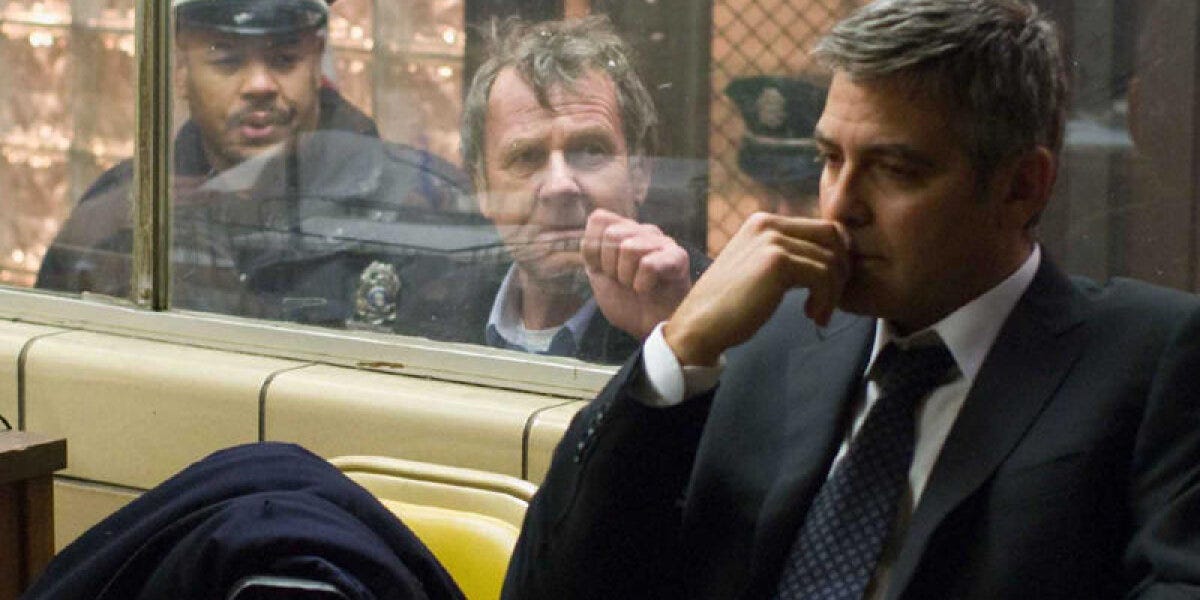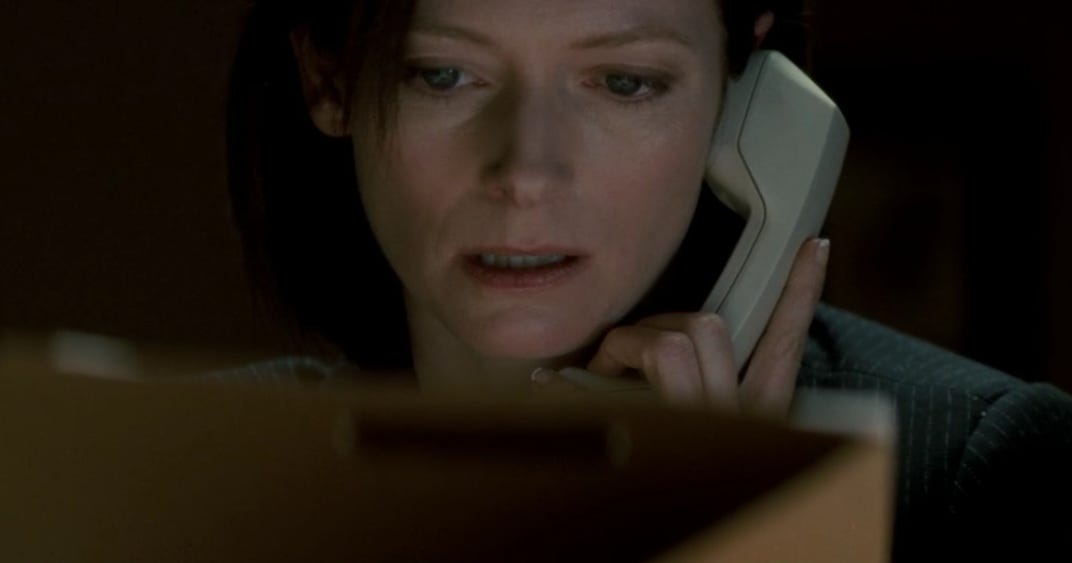Relitigating 'Michael Clayton'
George Clooney, Tilda Swinton, and Tom Wilkinson star in Tony Gilroy's bleak, unfussy legal thriller
Michael Clayton was a big deal to me in high school.
This is a movie that was released at a pivotal time for my budding cinephilia: the year 2007. I was 17, starting to regularly read movie reviews, and able to go to both my hometown video rental store (RIP) and nearby theaters to see whatever I wanted.
Michael Clayton dropped in October of that year, and I saw it theatrically opening weekend.
I was unfamiliar with the art of the legal thriller in 2007. In my defense (get it?), I was a junior in high school. Appreciating the judicial system as a conduit for thrills was not yet in my wheelhouse.
The only lawyer/court-centric films that I remember seeing at this age were flashy, trashy cable-core John Grisham adaptations like A Time to Kill and Runaway Jury, and the high-art comedy masterpiece Legally Blonde.
But Michael Clayton hit me. And I’m happy to say that like many other films released that year, it still does.
Written and directed by Tony Gilroy, the movie takes place entirely outside courtrooms, trading them for shabby, anonymous office spaces, motel rooms, and the unpretentiously adorned homes of our title character’s clients and colleagues.
Michael Clayton (George Clooney) wishes he was in court. A former prosecutor, he now works as a fixer for a large New York law firm.
That means he gets called in the middle of the night to deal with a rich asshole who fled the scene after hitting someone with his car, or whisked off to Wisconsin to deal with a trial lawyer who has suddenly gone off the deep end.
Much of the movie’s story pivots on the latter incident. Arthur (the late, great Tom Wilkinson) had been spearheading chemical company UNorth’s defense in a multi-billion dollar lawsuit for years before deciding he’s had enough. The class action suit alleges that UNorth poisoned people with a weed killer.
Arthur is the destablizer to the film’s otherwise monotonous, empty world. Wilkinson digs into the troubled but genius character; he spurts his realizations as if he’s wretching them up. Before we know who he is in the context of the story, we hear him in a frenzied voiceover aimed at Michael.
The monotonous evil of this case, combined with Arthur most likely going off his medication, has made him feel filthy, that his lawfirm’s “sole function is to excrete the… poison, the ammo, the defoliant necessary for other, larger, more powerful organisms to destroy the miracle of humanity.”
During a deposition for the UNorth case one day, Arthur rises from his chair, strips, and chants about loving one of the plaintiffs.
That’s when Michael, the so-called “janitor,” is sent to clean up his mess.
There is little room for personal relationships in this world, yet it’s clear that Michael admires Arthur and wants to keep him afloat. Unlike Wilkinson, Clooney’s performance is all in the eyes; tired, rundown, going through the motions. But when he is helping Arthur, or talking to his young son, a different emotion bubbles up: sadness, desperation.
The attachment Michael feels is the only thing between Arthur and career implosion, or worse.
Enter the third principal lawyer in this corrupt legal tango: A decidedly unprincipled woman named Karen Crowder (Tilda Swinton, in an Oscar-winning performance).
Karen is the chief counsel for UNorth. Arthur’s moral awakening has the potential for financial catastrophe, and must be dealt with. Gilroy reveals the criminal element lurking beneath this world with a banality that is shocking.
We see Karen on the phone at her motel room desk one night, the contents of a stolen briefcase scattered in front of her. At first, the only hint that something is amiss are the slight nervous tremors in her voice. Listen to Swinton’s voice modulation here; this is a character who is used to rehearsing everything, who seemingly colors within the professional lines, suddenly revealing a different side of herself.
As the conversation continues, the man on the other end of the line asks for a password. This standard head-on shot of Swinton at the desk now adds another level of menace: She lifts up a card with her right hand, which is covered in a plastic bag.
Details like this are essential to the movie’s sense of unease. Karen knew how to obtain this password, she knew the options available to her multi-billion dollar employer, and doesn’t hesitate to take advantage of them. To her, Arthur is a bug that must be squashed by any means.
Michael, Arthur, and Karen form the central moral conflict at the heart of the film. The three never share the screen, giving the impression that Michael is being volleyed between them. He goes from Arthur’s fire-and-brimstone prophesizing to Karen and UNorth’s quiet, sinisterly confident corporate expectations.
A lesser movie would probably make Arthur’s moral awakening more contagious. His tragic arc would inspire Michael to join the fight against chemical company malpractice, or something. But Michael is not that kind of guy.
The movie seems like it’s going to end with a rousing, movie-star moment for Clooney. Michael confronts Karen about her various nefarious dealings before handing her over to the police. He gets to shout down another lawyer again and for a moment, the spark returns to his eyes. He was briefly back in the courtroom, if only in his head.
But then the camera keeps following him after his moment of triumph. He exits what looks like another dull conference meeting space and enters a taxi. He gives the driver $50 and tells him to just drive.
As the credits begin, Gilroy holds on a shot of Clooney’s face sitting and thinking in the back of the cab. This complicates the heroic confrontation we’ve just witnessed. Taking Karen down seemed to take everything out of Michael. It was a taste of a different life, but it’s unclear if he’ll move on from his firm or report to work the next day.
Nothing about what we’ve seen suggests he’s had the huge change of heart that Arthur did. Karen is someone who didn’t learn to operate quietly in the shadows like Michael, and their confrontation is as much about rubbing that in her face as it is about her explosive, extra-judicial activities. Michael Clayton is about the right way to break the rules. Something is only wrong if you get caught, if you fail, or if you’re too loud.
That’s how lawyers think, right?







